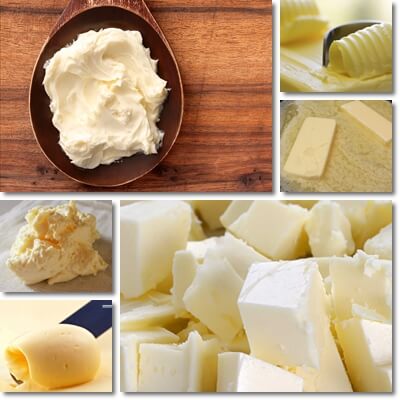Despite research and nutrition experts having revised their professional opinions about butter consumption and currently advocating for its use in limited amounts in view of achieving better nutrition, many people still wonder: is butter healthy? And if so, what does butter do for our health more exactly? Believe it or not, there are quite a few benefits to eating small amounts of butter infrequently, and I stress small amounts infrequently. There are benefits for vision and skin, brain and nervous system, immune and even cardiovascular system. Butter is also good for relieving constipation and boosting fertility.
The disapproval of butter mostly stems from the fact that it’s almost entirely a fat (80 to 85% for commercial butter and 65% for traditional butter) and many people still believe that fats are bad for you in all amounts and all forms. In reality, fats are essential nutrients, meaning they are vital for your good health. Some are better than others, but even the fats that are not all that healthy, but are naturally occurring aren’t actually bad for you.

This is especially true for butter which is rich in saturated fats. Once believed to just cause cardiovascular disease, saturated fats from natural, unprocessed foods like butter and other dairy have no ill effect on cardiovascular health when consumed in limited amounts, as part of an overall balanced diet. They may even exert benefits as they come from an unprocessed food. With this idea in mind, let’s see what the benefits of eating small amounts of butter infrequently are.
1) Good for vision and skin
Butter is naturally rich in vitamin A. Vitamin A is especially needed in the human retina, where it helps with color vision, essentially helping us see in bright light, as well as improves vision in low light. A severe deficiency can lead to poor eyesight over time. Vitamin A further helps maintain healthy skin by regulating the differentiation of skin cells (meaning it helps newly formed skin cells grow up to be what they are needed to be) and prevent dry skin.
To put things into perspective:
100 g of butter contains 684 mcg of vitamin A, which represents about 78% of the RDI (reference daily intake) for an average adult on a 2000 kcal diet. This is a lot of vitamin A.
1 tablespoon of butter (14.2 g) provides over 10% of the daily recommended intake of vitamin A for an average adult. This means that just one tablespoon of butter can really up your vitamin A intake.
2) Better immunity
The vitamin A content of butter makes it a good food for a strong immune system. Vitamin A activates the production of a type of white blood cell called T cell and determines its differentiation (the specific type of T cell it matures into). As a result of this contribution to the immune system, the vitamin also plays a role in preventing auto-immune reactions. Autoimmunity occurs when a hyperactive immune system produces antibodies against normal, healthy cells and tissues in the body or against harmless elements normally present in the body.
Vitamin A also activates dormant stem cells that produce white blood cells for the immune system. Lastly, it helps maintain healthy mucous membranes like those in the nose or stomach, helping better protect us from any viruses, bacteria, parasites or fungi that may try to produce infection from there. Cholesterol in butter also helps us synthesize vitamin D for a stronger immune system. So if you were looking for reasons to eat some butter, then good immunity is one of them. Read more about how to have a strong immune system in the article 10 Vitamins and Minerals for Good Immunity.

3) Supports learning, boosts memory, protects the nervous system
Fat is food for the brain and butter has plenty of it of all kinds (saturated, unsaturated). Generally speaking, fat nourishes the brain and is needed to support learning and intellectual performance. A specific kind of fat in butter, cholesterol, protects nerve cells by maintaining their myelin coating intact (works best if you also get enough vitamin B12). This has long-term benefits for memory and is believed to help prevent degenerative diseases of the nervous system such as Alzheimer’s or multiple sclerosis.
4) Good for brain fog
If you are feeling a bit scatter-brained, can’t focus and are lacking productivity, one thing you can do about it is eat one or two slices of toast with butter. The fats in the butter will help nourish the brain, sustain cognitive functions and essentially improve brain fog. Effects may include reduced mental fatigue, enhanced cognitive processes and improved productivity. Taking B vitamins and eating protein are also good remedies for brain fog, as are avoiding coffee and caffeinated beverages, sleeping more, exercising, spending time outdoors and reducing from stress by pursuing a hobby.
5) Cardiovascular benefits
Did you know that butter made from grass-fed cow’s milk is actually good for the heart and vascular system in limited amounts? Despite the fact that most butter is 50% saturated fat, this doesn’t produce any ill effects on cardiovascular health, provided consumption is limited. On the contrary, healthy fatty acids in butter from organic agriculture have been shown to lower the risk of cardiovascular diseases. Omega-3 and conjugated linoleic acid both exert important anti-inflammatory effects on arteries. Omega-3 further benefits cholesterol profile, while conjugated linoleic acid exerts benefits for metabolism, helping you achieve and maintain a healthy weight which has long-term benefits for cardiovascular health. Just make sure you choose unsalted butter.
6) Boosts fertility in women
How is eating butter good for fertility? First of all, because it contains cholesterol. Cholesterol is responsible for vitamin D metabolism and vitamin D is essential for female fertility. There are receptors for vitamin D in all organs and tissues directly responsible for fertility in women. And cholesterol helps us better synthesize the vitamin. Moreover, cholesterol is directly involved in hormone production, another crucial aspect for good fertility. Lastly, studies show that being underweight or having too little body fat (less than 10%) can cause a reduction in fertility. Eating some butter can help maintain a healthy weight and body fat percentage and ultimately provide benefits for fertility.
7) Digestive benefits: low in lactose and good for constipation
Cultured butter is made from fermented whole milk or cream. Lactic acid bacteria eat the sugar lactose in milk and produce lactic acid. The resulting butter has a low lactose content which means that it is possible for people with milk lactose intolerance to eat small amounts of butter. However, those with severe lactose intolerance may need to avoid all dairy, including butter. Also, as a fat, it helps ease the passing of bowel movements, contributing to constipation relief.
Butter nutritional information
Butter nutrition labels may only show fat content (65% in traditional butter to 85% in commercial butter) or list other ingredients like milk proteins, water content, in some cases thickening agents, flavorings or other artificial stabilizers, depending on the brand and their manufacturing process. Usually, vitamin and mineral content is not listed, except if the butter has been enriched.
Butter nutrition facts:
– Energetic value: 717 kcal/100 g or 102 kcal/tablespoon (14.2 g)
Butter macronutrients:
– Fat content: 65% in traditionally prepared butter, 80% to 85% in commercial butter
– Saturated fatty acids: 50.5 g in 100 g of butter
– Unsaturated fatty acids: 23.5 g monounsaturated fats, 3 g polyunsaturated fats
– Cholesterol: 215 mg/100 g of butter or 41 mg/tablespoon (14.2 g)
– Water content: 30% in traditional butter, 15% in commercial butter
– Milk proteins: around 1 g of protein per 100 g or 1% of total weight
– Carbohydrates: 0.06 g
– Fiber: 0
Butter vitamins and minerals profile:
– Fat-soluble vitamins naturally present: vitamin A in generous amounts (694 mcg/100 g) and E (2.32 mg/100g), trace amounts of vitamins D and K (around 1% of recommended daily intake), no vitamin C (0%)
– Water-soluble vitamins: vitamins B1, B2, B3, B5, B6, B9 and B12 are present in trace amounts (from less than 1% to up to 3% of recommended daily intake)
– Minerals: trace amounts of calcium, iron, magnesium, phosphorus, potassium and zinc (1% to 2% of recommended daily intake)
– Sodium per 100 g: 11 mg in unsalted butter, 643 mg in salted butter
Frequently asked questions
Is butter dairy? Yes, butter is a dairy product made from whole milk or cream.
Is butter gluten free? Yes. Gluten is a protein in wheat and other grains. Butter contains very little milk proteins, but not gluten.
Is butter a carb? No, it isn’t. Butter is fat because it contains between 65% and 85% fat. It contains 0.06 g of carbohydrates, so almost no carbs which means it can’t be called a carb.
Is eating butter good for diabetics? Butter can be part of a diabetic diet only if consumed in very small amounts infrequently. The rest of the diet should be tailored to avoid weight gain. Ask your doctor if and how much butter you can eat if you have diabetes.
Are there any butter benefits for thyroid? Not specifically. But as an unprocessed food, preferably from organic agriculture, it can help with general good health.
Read more about the Properties and Benefits of Butter and its by-product, buttermilk in Properties and Benefits of Buttermilk.
Conclusion
When trying to decide if eating butter is good for you or not, don’t just think about how many grams of fat it contains or just the fact that it contains a lot of unsaturated fat. You aren’t supposed to eat a whole stick of butter in one sitting anyway. Instead, think about the food as a whole: whether it’s processed or unprocessed, whether it comes from organic agriculture or not, what other nutrients it contains, how important are these nutrients for good health in general and for you in particular (so your individual nutritional requirements), other ingredients and elements present etc. And remember that eating butter is only good for you in small amounts, occasionally.

